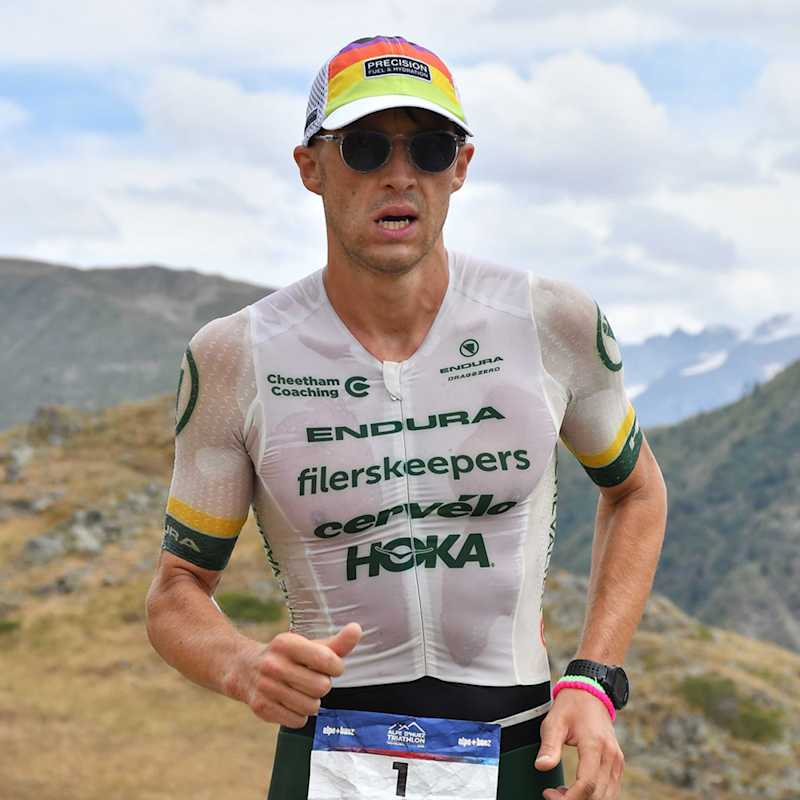
Leon Chevalier
IRONMAN® Bolton
Leon's headline numbers
Leon's strategy
Fueling
Carbohydrate is the main fuel you burn when racing. Failing to fuel properly is a leading cause of underperformance in longer races.
Leon’s strategy was to use his pre-mixed energy drink to get him through the first four hours on the bike, drinking every 10-20 minutes to ensure a steady flow of glucose into his bloodstream to prevent any drops in energy. As we’ve seen Leon do before, he took a final gel towards the end of the bike section to pre-empt the run. Then whilst running, he stuck to his plan of taking one PF 30 Gel every 7k or so, no doubt helping maintain his energy levels right up until the finish. For future races, increasing his carb intake on the bike to be more in line with the scientific recommendations of 90 grams of carb per hour would hopefully allow him to push even harder.
Hydration
Taking on board an appropriate amount of fluid and sodium is essential to maintaining blood volume and supporting the cardiovascular effort needed to perform on race day.
Whilst the absolute amount of sodium and fluid consumed per hour is important, it’s critical to consider these in relation to each other. This is known as 'relative sodium concentration' and it’s expressed in milligrams per litre (mg/L). How much sodium you’re taking in per litre of fluid is more important than the absolute amount taken in per hour.
Sweat sodium concentration (mg/L) is largely genetically determined and remains relatively stable. Knowing how salty your sweat is enables you to replace a good proportion of your sweat losses, which can range from 200-2,000mg/L.
Given Leon’s losses are High (1,392mg/L), nailing his hydration strategy remains important, even when it’s Mild.
Learn moreSince Leon knew the cooler conditions meant his sweat rate wasn’t particularly high, he sensibly adjusted his fluid intake slightly, ensuring he replaced his sweat losses without over-hydrating. He had a fantastic race without any hydration-related issues, although his relative sodium concentration was notably low. He only had a few Electrolyte Capsules on the bike, and even though his sweat rate wasn’t excessive, Leon is a fairly salty sweater; therefore he was only replacing a small proportion of the sodium he would have been losing in his sweat during the race. Especially in hotter conditions, Leon should consider increasing his sodium intake to stay well hydrated so he can perform at his best and avoid the risk of hyponatremia. Incorporating PH 1500 into his bottles would be an easy way to bring his sodium concentration up and move this part of his strategy in the right direction.
Caffeine
Beyond the Three Levers of Performance (carb, sodium and fluid), caffeine is one of only a few substances that is proven to improve performance for most endurance athletes as it can help stave off mental and physical fatigue.
Most of Leon’s caffeine intake came during the run in the form of caffeinated energy gels and a decent amount of cola. This put him within the scientific recommendations based on body weight, allowing him to reap the ergogenic benefits that the stimulant provides, helping to limit the feeling of fatigue.
How Leon hit his numbers
Here's everything that Leon ate and drank on the day...
Leon's weapons of choice
Final thoughts
Leon's full stats
Data Confidence?
There is good confidence in the accuracy of the data reported. An athlete feels that the numbers closely reflect what they consumed despite a couple of estimations which may carry some degree of error. The majority of what was consumed is recorded to a high level of specificity (most volumes are known through the use of bottles brands quantities flavours). The numbers are very plausible and align with previous data recordings (if an athlete has collected data previously).